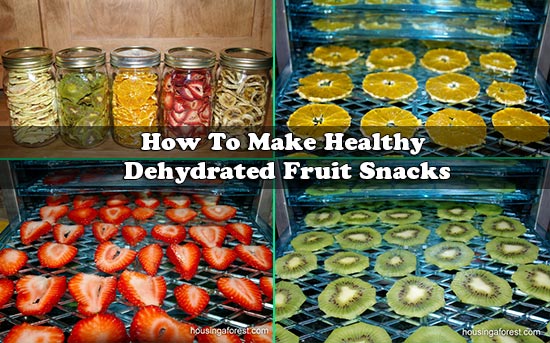How To Make Healthy Dehydrated Fruit Snacks
Make sure to like Living Green and Frugally on Facebook, Shop at Amazon to help support my site and explore our PINTEREST BOARDS for innovative ways you can become self-sufficient.
Healthy Dehydrated Fruit: A Tasty, Nutritious, and Convenient Snack
In recent years, the popularity of healthy snacks has been on the rise, and dehydrated fruits have emerged as one of the most sought-after options. Dehydration is a time-honored preservation method that involves removing the water content from fruits, resulting in a concentrated, chewy, and delicious treat.
Not only do dehydrated fruits offer a convenient, on-the-go option, but they are also packed with essential nutrients, making them a guilt-free indulgence. In this article, we will explore why dehydrated fruits are a fantastic addition to your diet, the dehydration process, the best fruits to try, and some additional tips for enjoying them to the fullest.
Why Choose Dehydrated Fruits?
- Nutrient Retention: Dehydration gently removes moisture from fruits, but it preserves most of their nutrients. Vitamins, minerals, and fiber remain largely intact, providing a healthful alternative to processed and sugary snacks.
- Natural and Unprocessed: Unlike many commercially processed snacks, dehydrated fruits have no additives, preservatives, or added sugars. They are pure and wholesome, promoting overall well-being.
- Portability and Shelf-Life: Dehydrated fruits have an extended shelf-life compared to fresh fruits, making them an excellent option for storing and carrying around in your bag or backpack. They are ideal for travel, hiking, or busy days when you need a quick and nutritious pick-me-up.
- Digestive Health: Dehydrated fruits, being rich in fiber, can support healthy digestion and help prevent constipation. They also offer a feeling of satiety, making it easier to control your appetite and maintain a balanced diet.
The Dehydration Process:
Dehydrating fruits is a simple process that involves removing water content to prevent spoilage while preserving nutrients. Here’s a basic overview of how to dehydrate fruits at home:
- Choose Fresh, Ripe Fruits: Select ripe and unblemished fruits for the best results. Apples, bananas, strawberries, blueberries, mangoes, and pineapples are excellent choices.
- Preparing the Fruits: Wash the fruits thoroughly and slice them into even pieces. Smaller pieces dehydrate more quickly.
- Dehydrating: Use a food dehydrator or an oven set to a low temperature (between 130°F to 160°F or 54°C to 71°C) to dry the fruits. The process may take several hours to a day, depending on the fruit and the thickness of the slices.
- Store Properly: Once fully dehydrated, store the fruits in airtight containers or resealable bags. Keep them in a cool, dark place to maintain their quality.
Best Fruits to Try:
- Apples: Dehydrated apple slices have a delightful sweetness and a satisfying chewy texture.
- Bananas: Dried bananas offer a natural sweetness and are perfect for combating sugar cravings.
- Strawberries: Dehydrated strawberries are rich in vitamin C and add a burst of flavor to any snack mix.
- Mangoes: Dehydrated mango slices have a tropical taste and are a good source of vitamins A and E.
- Pineapples: Dried pineapple chunks are both tangy and sweet, providing a tropical twist to your snacking experience.
Tips for Enjoying Dehydrated Fruits:
- Trail Mix: Create your custom trail mix by combining dehydrated fruits with nuts, seeds, and dark chocolate for a satisfying and energizing snack.
- Cereal Topping: Sprinkle dehydrated fruits on your morning cereal or oatmeal to add natural sweetness and extra nutrients.
- Smoothie Boost: Blend dehydrated fruits into your smoothies to enhance their flavor and nutritional value.
- Baking: Incorporate dehydrated fruits into muffins, cookies, and granola bars to infuse them with a natural sweetness.
- Portion Control: Although dehydrated fruits are nutritious, they are calorie-dense. Enjoy them in moderation to maintain a balanced diet.
Conclusion: Dehydrated fruits offer a delightful way to enjoy the natural flavors and nutritional benefits of fruits in a convenient and long-lasting form. Whether you’re looking for a wholesome on-the-go snack, an addition to your breakfast routine, or a tasty ingredient for your culinary creations, dehydrated fruits have you covered. Embrace this healthy snacking trend and savor the goodness of nature in every chewy bite.
